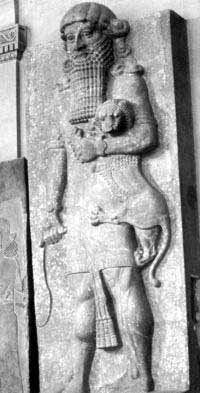
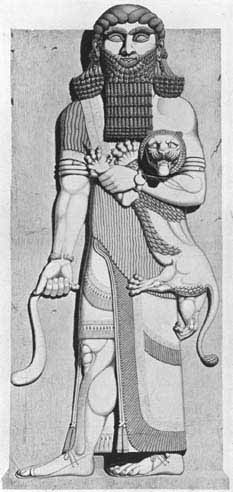
Gilgamesh, 8th Century BC,
Palace of Sargon II, Khorsabad


Gilgamesh, 8th Century BC,
Palace of Sargon II, Khorsabad
Gilgamesh was the fifth king of Uruk, modern day Iraq (Early Dynastic II, first dynasty of Uruk), placing his reign ca. 2500 BC. According to the Sumerian king list he reigned for 26 years. In the Tummal Inscription, Gilgamesh, and his son Urlugal, rebuilt the sanctuary of the goddess Ninlil, in Tummal, a sacred quarter in her city of Nippur.
Gilgamesh is the central character in the metaphoric poem "Epic of Gilgamesh", the greatest surviving work of early Mesopotamian literature. In the epic his father was Lugalbanda and his mother was Ninsun, a goddess. In Mesopotamian mythology, Gilgamesh is a demigod of superhuman strength who built the city walls of Uruk to defend his people from external threats, and travelled to meet the sage Utnapishtim, who had survived the Great Deluge. He is usually described as two-thirds god and one third man.
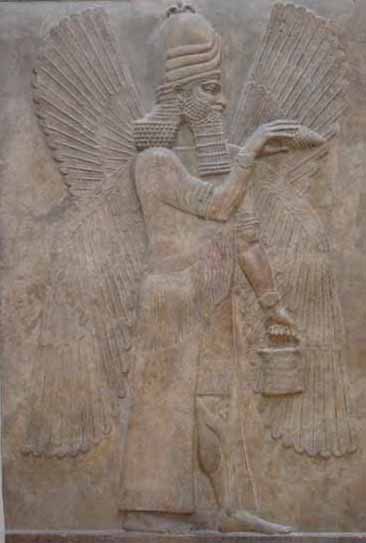
Sumerian Gods - Anunnaki
Create a Biogenetic Experiment called Humans
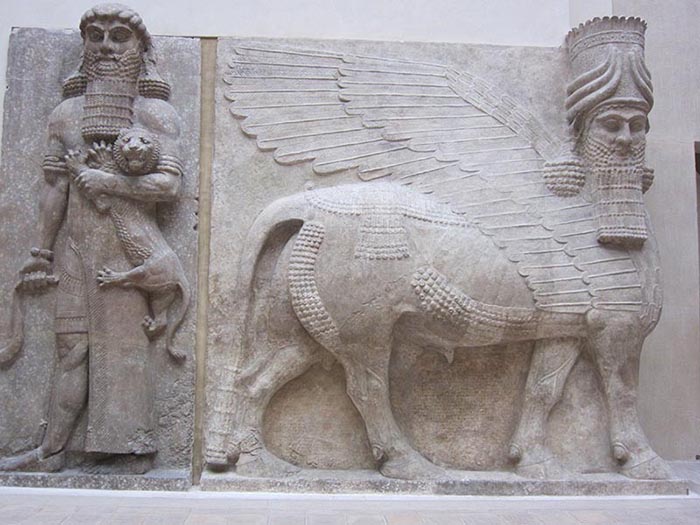
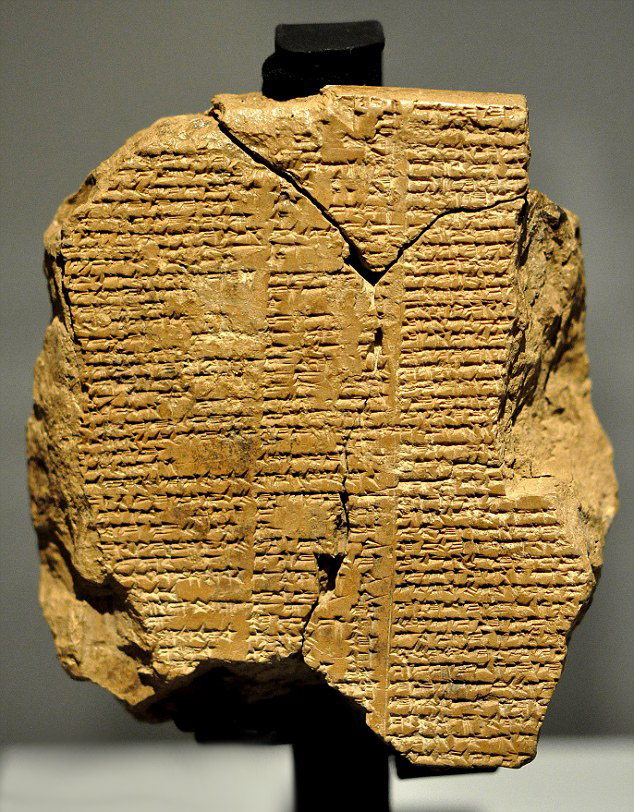
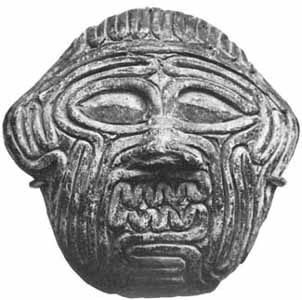
Humbaba
The story centers on a friendship between Gilgamesh and Enkidu. Enkidu is a wild man created by the gods as Gilgamesh's equal to distract him from oppressing the people of Uruk. Together, they journey to the Cedar Mountain to defeat Humbaba, its monstrous guardian. Later they kill the Bull of Heaven, which the goddess Ishtar sends to punish Gilgamesh for spurning her advances. As a punishment for these actions, the gods sentence Enkidu to death.
The later half of the epic focuses on Gilgamesh's distress at Enkidu's death, and his quest for immortality. In order to learn the secret of eternal life, Gilgamesh undertakes a long and perilous journey to find the immortal flood hero, Utnapishtim. He learns that "The life that you are seeking you will never find. When the gods created man they allotted to him death, but life they retained in their own keeping." His fame however lived on after his death, because of his great building projects, and his account of what Utnapishtim told him happened during the flood.
Many distinct sources exist over a 2,000-year timeframe. The old Sumerian poems, and a later Akkadian version, are the chief sources for modern translations, with the Sumerian version mainly used to fill in lacunae in the Akkadian version. Although several revised versions based on new discoveries have been published, the epic remains incomplete.
The earliest Sumerian poems are now generally considered to be distinct stories rather than parts of a single epic. They date from as early as the Third Dynasty of Ur (2150-2000 BC).
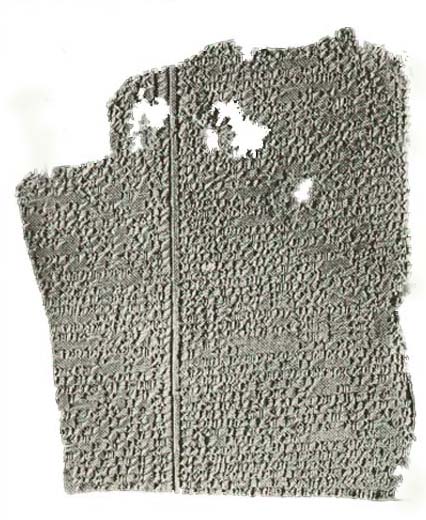
The earliest Akkadian versions are dated to the early second millennium most probably in the eighteenth or seventeenth century BC, when one or more authors drew upon used existing literary material to create a single epic.
The "standard" Akkadian version, consisting of 12 tablets, was edited by Sin-liqe-unninni sometime between 1300 and 1000 BC and was found in the library of Ashurbanipal in Nineveh.
The Epic of Gilgamesh was discovered by Hormuzd Rassam in 1853 and is now widely known. The first modern translation was published in the early 1870s by George Smith. Recent translations into English include one undertaken with the assistance of the American novelist John Gardner, and John Maier, published in 1984.
In 2001, Benjamin Foster produced a translation in the Norton Critical Edition Series that uses new material to fill in many of the blanks in previous editions.
The most definitive translation is a two-volume critical work by Andrew George. George discusses the state of the surviving material, and provides a tablet-by-tablet exegesis, with a dual language side-by-side translation. This translation was published by Penguin Classics in 2000. Stephen Mitchell in 2004 supplied a new controversial translation, which was published by FreePress, a division of Simon and Schuster. The first direct Arabic translation from the original tablets was made in the 1960s by the Iraqi archeologist Taha Baqir.
The discovery of artifacts (ca. 2600 BC) associated with Enmebaragesi of Kish, mentioned in the legends as the father of one of Gilgamesh's adversaries, has lent credibility to the historical existence of Gilgamesh.
The standard version was discovered by Austen Henry Layard in the library of Ashurbanipal in Nineveh in 1849. It was written in standard Babylonian, a dialect of Akkadian that was used for literary purposes. This version was compiled by Sin-liqe-unninni sometime between 1300 and 1000 BC from earlier material.
The standard version, and earlier version, have different opening words, or incipit. The older version begins with the words "Surpassing all other kings", while the standard version has "He who saw the deep". The Akkadian word nagbu, "deep", probably refers to "unknown mysteries". Andrew George believes that the mysteries it refers to is information brought back by Gilgamesh from his meeting with Uta-Napishti (Utnapishtim) about Ea, the fountain of wisdom. Gilgamesh was given knowledge of how to worship the gods, of why death was ordained for human beings, what makes a good king, and how to live a good life. The story of Utnapishtim, the hero of the flood myth, can also be found in the Babylonian Epic of Atrahasis.
The 12th tablet is a sequel to the original 11, and was probably added at a later date. It bears little relation to the well-crafted 11-tablet epic; the lines at the beginning of the first tablet are quoted at the end of the 11th tablet, giving it circularity and finality. Tablet 12 is a near copy of an earlier Sumerian tale, a prequel, in which Gilgamesh sends Enkidu to retrieve some objects of his from the Underworld, and he returns in the form of a spirit to relate the nature of the Underworld to Gilgamesh.
Tablet One
The story begins by introducing Gilgamesh, king of Uruk. Gilgamesh, two-thirds god and one-third man, is oppressing his people, who are crying out to the gods for help. For the young women of Uruk this oppression takes the form of a droit de seigneur - or "lord's right" - to sleep with newly married brides on their wedding night. For the young men (the tablet is damaged at this point) it is conjectured that Gilgamesh is exhausting them through games, tests of strength, or perhaps forced labour on building projects.
The gods respond to their pleas by creating an equal to Gilgamesh in order to distract him. They create a primitive man, Enkidu, who is covered in hair and lives in the wild with the animals. He is spotted by a trapper, whose livelihood is being ruined because Enkidu is uprooting his traps. The trapper tells Gilgamesh of the man, and it is arranged for Enkidu to be seduced by a harlot. This seduction by Shamhat, a temple prostitute, is his first step towards civilization, and after seven days of making love with him, she proposes to take him back to Uruk. Gilgamesh, meanwhile, has been having dreams that relate to the imminent arrival of a loved new companion.
Shamhat brings Enkidu to a shepherds' camp, where he is introduced to a human diet, and becomes the night watchman. Learning from a passing stranger about Gilgamesh's treatment of new brides, Enkidu is incensed and travels to Uruk to intervene at a wedding. When Gilgamesh attempts to visit the wedding chamber, Enkidu blocks his way, and they fight. After a fierce battle, Enkidu acknowledges Gilgamesh's superior strength and they become friends. Gilgamesh proposes a journey to the Cedar Forest to slay the monstrous demi-god Humbaba, in order to gain fame and renown. Despite warnings from Enkidu, and the council of elders, Gilgamesh will not be deterred.
Tablet Three
The elders give Gilgamesh advice for his journey. Gilgamesh visits his mother, the goddess Ninsun, who seeks the support and protection of the sun-god Shamash for their adventure. Ninsun adopts Enkidu as her son, and Gilgamesh leaves instructions for the governance of Uruk in his absence.
Tablet Four
Gilgamesh and Enkidu journey to the Cedar Forest. Every few days they camp on a mountain, and perform a dream ritual. Gilgamesh has five terrifying dreams about falling mountains, thunderstorms, wild bulls, and a thunderbird that breathes fire. Despite similarities between his dream figures and earlier descriptions of Humbaba, Enkidu interprets these dreams as good omens, and denies that the frightening images represent the forest guardian. As they approach the cedar mountain, they hear Humbaba bellowing, and have to encourage each other not to be afraid.
Tablet Five
The heroes enter the cedar forest. Humbaba, the ogre-guardian of the Cedar Forest, insults and threatens them. He accuses Enkidu of betrayal, and vows to disembowel Gilgamesh and feed his flesh to the birds. Gilgamesh is afraid, but with some encouraging words from Enkidu the battle commences. The mountains quake with the tumult and the sky turns black. The god Shamash sends 13 winds to bind Humbaba, and he is captured. The monster pleads for his life, and Gilgamesh pities him. Enkidu, however, is enraged and asks Gilgamesh to kill the beast. Humbaba curses them both and Gilgamesh dispatches him with a blow to the neck. The two heroes cut down many cedars, including a gigantic tree that Enkidu plans to fashion into a gate for the temple of Enlil. They build a raft and return home along the Euphrates with the giant tree and the head of Humbaba.
Tablet Six
Gilgamesh rejects the advances of the goddess Ishtar because of her mistreatment of previous lovers like Dumuzi. Ishtar asks her father Anu to send Gugalanna the Bull of Heaven to avenge her. When Anu rejects her complaints, Ishtar threatens to raise the dead who will "outnumber the living" and "devour them". Anu becomes frightened, and gives into her. Ishtar leads the bull of heaven to Uruk, and it causes widespread devastation. It lowers the level of the Euphrates river, and dries up the marshes. It opens up huge pits that swallow 300 men. Without any divine assistance, Enkidu and Gilgamesh attack and slay it, and offer up its heart to Shamash. When Ishtar cries out, Enkidu hurls one of the hindquarters of the bull at her. The city of Uruk celebrates, but Enkidu has an ominous dream.
Tablet Seven
In Enkidu's dream, the gods decide that one of the heroes must die because they killed Humbaba and the Bull of Heaven. Despite the protestations of Shamash, Enkidu is marked for death. Enkidu curses the great door he has fashioned for Enlil's temple. He also curses the trapper and Shamhat for removing him from the wild. Shamash reminds Enkidu of how Shamhat fed and clothed him, and introduced him to Gilgamesh. Shamash tells him that Gilgamesh will bestow great honors upon him at his funeral, and will wander into the wild consumed with grief. Enkidu regrets his curses and blesses Shamhat. In a second dream however he sees himself being taken captive to the Netherworld by a terrifying Angel of Death. The underworld is a "house of dust" and darkness whose inhabitants eat clay, and are clothed in bird feathers, supervised by terrifying beings. For 12 days, Enkidu's condition worsens. Finally, after a lament that he could not meet a heroic death in battle, he dies.
Tablet Eight
Gilgamesh delivers a lamentation for Enkidu, in which he calls upon mountains, forests, fields, rivers, wild animals, and all of Uruk to mourn for his friend. Recalling their adventures together, Gilgamesh tears at his hair and clothes in grief. He commissions a funerary statue, and provides grave gifts from his treasury to ensure that Enkidu has a favourable reception in the realm of the dead. A great banquet is held where the treasures are offered to the gods of the Netherworld. Just before a break in the text there is a suggestion that a river is being dammed, indicating a burial in a river bed, as in the corresponding Sumerian poem, The Death of Gilgamesh.
Tablet Nine
Tablet nine opens with Gilgamesh roaming the wild clothed in animal skins, grieving for Enkidu. Fearful of his own death, his decides to seek Utnapishtim ("the Faraway"), and learn the secret of eternal life. Among the few survivors of the Great Flood, Utnapishtim and his wife are the only humans to have been granted immortality by the gods. Gilgamesh crosses a mountain pass at night and encounters a pride of lions. Before sleeping he prays for protection to the moon god Sin. Then, waking from an encouraging dream, he kills the lions and uses their skins for clothing. After a long and perilous journey, Gilgamesh arrives at the twin peaks of Mount Mashu at the end of the earth. He comes across a tunnel, which no man has ever entered, guarded by two terrible scorpion-men. After questioning him and recognizing his semi-divine nature, they allow him to enter it, and he passes under the mountains along the Road of the Sun. In complete darkness he follows the road for 12 "double hours", managing to complete the trip before the Sun catches up with him. He arrives at a garden paradise full of jewel-laden trees.
Tablet Ten
Meeting the ale wife Siduri, who assumes, because of his dishevelled appearance, that he is a murderer, Gilgamesh tells her about the purpose of his journey. She attempts to dissuade him from his quest, but sends him to Urshanabi the ferryman, who will help him cross the sea to Utnapishtim. Gilgamesh destroys some stone-giants that live with Urshanabi. He tells him his story, but when he asks for his help Urshanabi informs him that he has just destroyed the only creatures who can cross the Waters of Death, which are deadly to the touch. Urshanabi instructs Gilgamesh to cut down 300 trees, and fashion them into punting poles. When they reach the island where Utnapishtim lives, Gilgamesh recounts his story asking him for his help. Utnapishtim reprimands him, declaring that fighting the common fate of humans is futile and diminishes life's joys.
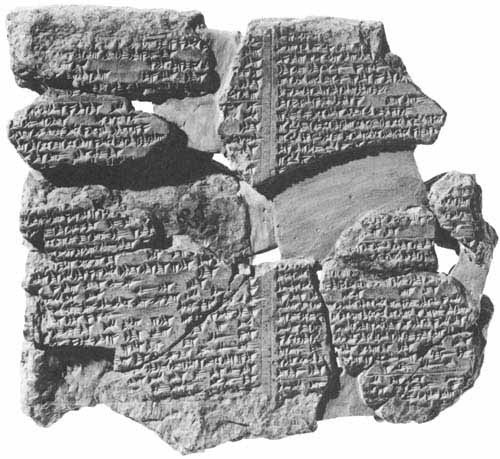
Tablet Eleven
Gilgamesh observes that Utnapishtim seems no different from himself, and asks him how he obtained his immortality. Utnapishtim explains that the gods decided to send a great flood. To save Utnapishtim the god Ea told him to build a boat. He gave him precise dimensions, and it was sealed with pitch and bitumen. His entire family went aboard, together with his craftsmen and "all the animals of the field". A violent storm then arose which caused the terrified gods to retreat to the heavens. Ishtar lamented the wholesale destruction of humanity, and the other gods wept beside her.
The storm lasted six days and nights, after which "all the human beings turned to clay". Utnapishtim weeps when he sees the destruction. His boat lodges on a mountain, and he releases a dove, a swallow, and a raven. When the raven fails to return, he opens the ark and frees its inhabitants. Utnapishtim offers a sacrifice to the gods, who smell the sweet savor and gather around. Ishtar vows that just as she will never forget the brilliant necklace that hangs around her neck, she will always remember this time. When Enlil arrives, angry that there are survivors, she condemns him for instigating the flood. Ea also castigates him for sending a disproportionate punishment. Enlil blesses Utnapishtim and his wife, and rewards them with eternal life. This account matches the flood story that concludes the Epic of Atrahasis.
Flood tablet in Akkadian
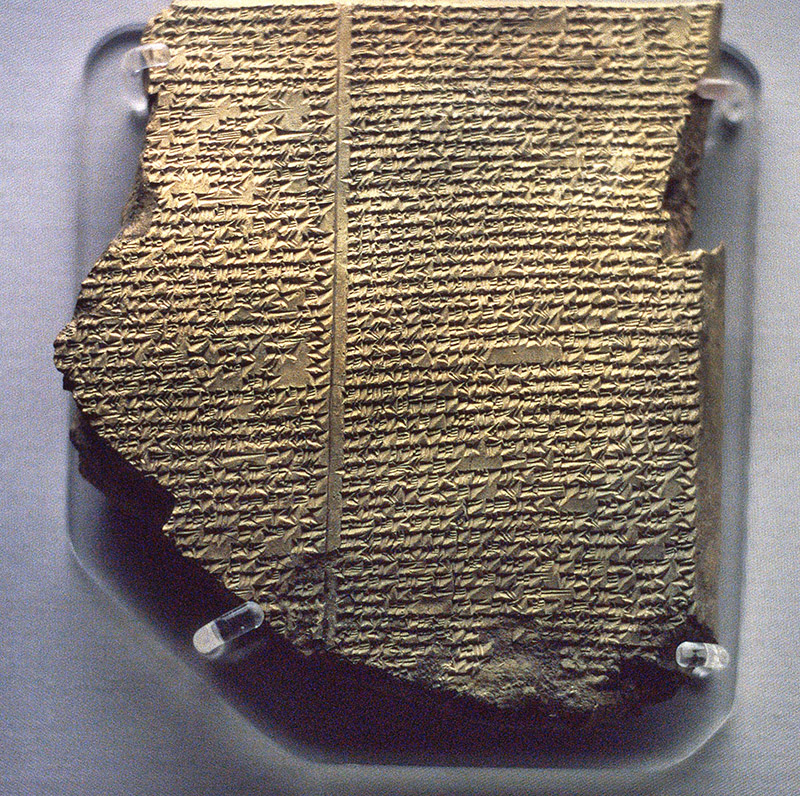
The Gilgamesh flood myth is a deluge story in the Epic of Gilgamesh. Many scholars believe that the flood myth was added to Tablet XI in the "standard version" of the Gilgamesh Epic by an editor who utilized the flood story from the Epic of Atrahasis. A short reference to the flood myth is also present in the much older Sumerian Gilgamesh poems, from which the later Babylonian versions drew much of their inspiration and subject matter.
The main point seems to be that when Enlil granted eternal life it was a unique gift. As if to demonstrate this point, Utnapishtim challenges Gilgamesh to stay awake for six days and seven nights. Gilgamesh falls asleep, and Utnapishtim instructs his wife to bake a loaf of bread on each of the days he is asleep, so that he cannot deny his failure to keep awake. Gilgamesh, who is seeking to overcome death, cannot even conquer sleep! After instructing Urshanabi the ferryman to wash Gilgamesh, and clothe him in royal robes, they return back to Uruk.
As they are leaving, Utnapishtim's wife asks her husband to offer a parting gift. Utnapishtim tells Gilgamesh that at the bottom of the sea there lives a boxthorn-like plant that will make him young again. Gilgamesh, by binding stones to his feet so he can walk on the bottom, manages to obtain the plant. He intends to test it on an old man when he returns to Uruk. Unfortunately, when Gilgamesh stops to bathe, it is stolen by a serpent, who sheds its skin as it departs. Gilgamesh weeps at the futility of his efforts, because he has now lost all chance of immortality. He returns to Uruk, where the sight of its massive walls prompts him to praise this enduring work to Urshanabi.
Tablet Twelve
This tablet is mainly an Akkadian translation of an earlier Sumerian poem, Gilgamesh and the Netherworld (also known as "Gilgamesh, Enkidu, and the Netherworld" and variants), although it has been suggested that it is derived from an unknown version of that story.
The contents of this last tablet are inconsistent with previous ones: Enkidu is still alive, despite having been killed off earlier in the epic. Because of this, its lack of integration with the other tablets, and the fact that it is almost a copy of an earlier version, it has been referred to as an 'inorganic appendage' to the epic.
Alternatively, it has been suggested that "its purpose, though crudely handled, is to explain to Gilgamesh (and the reader) the various fates of the dead in the Afterlife" and in "an awkward attempt to bring closure", it both connects the Gilgamesh of the epic with the Gilgamesh who is the King of the Netherworld, and is "a dramatic capstone whereby the twelve-tablet epic ends on one and the same theme, that of "seeing" (understanding, discovery, etc.), with which it began."
Gilgamesh complains to Enkidu that various of his possessions (the tablet is unclear exactly what - different translations include a drum and a ball) have fallen into the underworld. Enkidu offers to bring them back. Delighted, Gilgamesh tells Enkidu what he must and must not do in the underworld if he is to return. Enkidu does everything which he was told not to do. The underworld keeps him. Gilgamesh prays to the gods to give him back his friend. Enlil and Suen don’t reply but Ea and Shamash decide to help. Shamash makes a crack in the earth, and Enkidu's ghost jumps out of it. The tablet ends with Gilgamesh questioning Enkidu about what he has seen in the underworld.
This poem includes an account of Gilgamesh journey to the bottom of the sea to obtain the plant (seed or flower) of life. As he stopped to bathe at a spring on the way home, a hungry snake (metaphors: human DNA, spiraling consciousness) snatched the plant. When Gilgamesh saw the creature cast off its old skin to become young again, it seemed to him a sign that old age was the fate of humans.
All tablets except for the second and third are from different origins than the version above, so this summary is made up out of different versions.
2. Gilgamesh tells his mother Ninsun about two dreams he had. His mother explains that they mean that a new companion will soon arrive at Uruk. In the meanwhile Enkidu and the harlot (here called Shamkatum) are making love. She civilizes him in company of the shepherds by offering him bread and beer. Enkidu helps the shepherds by guarding the sheep. They travel to Uruk where Gilgamesh and Enkidu finally meet. Enkidu and Gilgamesh battle but Gilgamesh breaks off the fight. Enkidu praises Gilgamesh.
3. The tablet is broken here, but it seems that Gilgamesh has suggested going to the Pine Forest to cut down trees and kill Humbaba (known here as Huwawa). Enkidu protests, he knows Huwawa and is aware of his power. Gilgamesh talks Enkidu into it with some words of encouragement but Enkidu remains reluctant. They prepare, and call for the elders. The elders also protest, but after Gilgamesh talks to them they wish him good luck.
4. 1(?) tablet missing 5. Fragments from two different versions/tablets tell how Enkidu encourages Gilgamesh to slay Humwawa. Mention is made of Huwawa's "seven auras" which are not referred to in the standard version. When Gilgamesh kills Huwawa they chop down part of the forest. Enkidu cuts a door for Enlil and lets it float down the Euphrates.
6. Tablets missing
7. Gilgamesh argues with Shamash about the futility of his quest. The tablet is damaged. We then find Gilgamesh talking with Siduri about his quest and his journey to meet Ut-Napishtim (here called Uta-na’ishtim). Siduri also questions his goals. Gilgamesh smashes the stone creatures and talks to the ferryman Urshanabi (here called Sur-sunabu). After a short discussion Sur-sunabu asks him to carve 300 oars so that they may cross the waters of death without needing the crew of stone creatures. The rest of the tablet is damaged.
8. Tablet(s)
There are five extant Gilgamesh poems in Sumerian. These probably circulated independently, rather than being in the form of a unified epic. Some of the names of the main characters in these poems differ slightly from later Akkadian names, and that there are some differences in the underlying stories (e.g. in the Sumerian version Enkidu is Gilgamesh's servant):
2. Gilgamesh and the Bull of Heaven (corresponds to the Bull of Heaven episode (tablet 6) in the Akkadian version. The Bull's voracious appetite causes drought and hardship in the land).
3. Gilgamesh and Aga (Gilgamesh vs. Aga of Kish, has no corresponding episode in the epic, but the themes of whether to show mercy to captives, and counsel from the city elders, also occur in the standard version of the Humbaba story).
4. Gilgamesh, Enkidu and the Netherworld (corresponds to tablet 12 in the Akkadian version).
5.The Death of Gilgamesh (this is the story of Gilgamesh's, rather than Enkidu's, death).
Various themes, plot elements, and characters in the Epic of Gilgamesh can also be found in the Bible, in particular in the stories of Adam and Eve in the Garden of Eden (both stories involve a serpent) and the story of Noah and the Flood.
The parallels between the stories of Enkidu/Shamhat and Adam/Eve have been long recognized by scholars. In both, a man is created from the earth and lives in a natural setting. A woman is introduced to him, he clothe himself, and is thereafter unable to return to his former state.
Andrew R. George claims that the Flood episode in Gen. 6–8 matches the older Babylonian myth so closely, that few doubt that it derives from the Mesopotamian account. What is particularly noticeable is the way the Genesis flood story follows the Gilgamesh flood tale "point by point and in the same order", even when the story permits other alternatives.
Matthias Henze suggests that Nebuchadnezzar's madness in the biblical book of Daniel draws on the Epic of Gilgamesh. He claims that the author uses elements from the description of Enkidu to paint a sarcastic and mocking portrait of the king of Babylon.
Many scholars note an influence on the book of Ecclesiastes. The speech of Sidhuri in an old Babylonian version of the epic is so similar to Ecclesiastes 9:7–10 that there is likely to be a direct influence. For example, it includes a saying about the strength of a triple-stranded rope, which can only be found in the Epic of Gilgamesh and Ecclesiastes (4:12).
Numerous scholars have drawn attention to various themes, episodes, and verses, that indicate a substantial influence of the Epic of Gilgamesh on both of the epic poems ascribed to Homer. These influences are detailed by Martin Litchfield West in The East Face of Helicon: West Asiatic Elements in Greek Poetry and Myth.
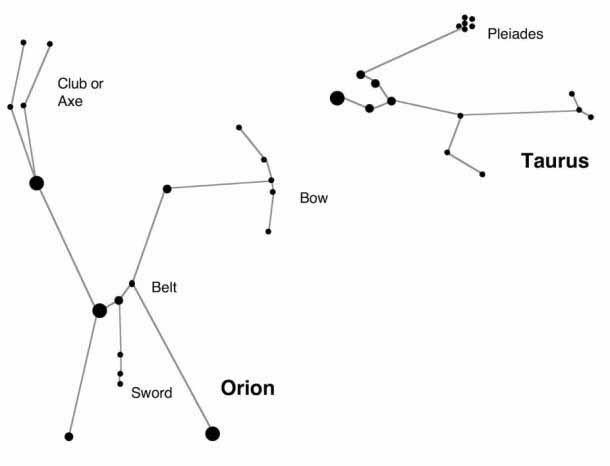
Gilgamesh is the ancient Sumerian epic, written some 4,000 years ago on cuneiform clay tablets and rediscovered only in the nineteenth century. It is a story that has echoes of the biblical Old Testament, with its graphic details of a great flood and the formation of mankind from the dust of the earth. The bulk of the story is devoted to a king of Sumer, known as Gilgamesh, and his epic quest into the mystical forests of cedar, where he performs many heroic deeds.
Although this epic story from the beginnings of recorded history contains mythical elements, it is nevertheless thought to be a biography of this Sumerian king making his mark on the world - a story of daring-do by a heroic princeling. But it is entirely possible that this classical interpretation is in error, both in its interpretation and in its chronology. Indeed, the Gilgamesh epic may up to 600 years younger than previously thought.
During the research for the book Jesus, Last of the Pharaohs, Ralph had been working on the theory that the bulk of the biblical Old Testament was, in fact, based on similar theology to that found in Egypt and Sumer. With its constant reference to bulls, sheep and fish, the Bible portrays definite echoes of an ancient astrological religion, a story of the constellations onto which the history of the patriarchal family has been grafted.
In the Gilgamesh epic, we find a similar epic tale of a battle with bulls and sheep, one that can just possibly be interpreted as a clash of the stellar constellations, a battle between Aries and Taurus. Read more ...
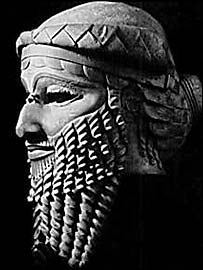
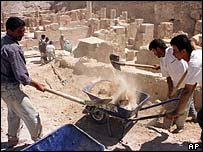
Gilgamesh tomb believed found BBC - April 29, 2003
Archaeologists in Iraq believe they may have found the lost tomb of King Gilgamesh - the subject of the oldest "book" in history. The Epic Of Gilgamesh - written by a Middle Eastern scholar 2,500 years before the birth of Christ - commemorated the life of the ruler of the city of Uruk, from which Iraq gets its name. Now, a German-led expedition has discovered what is thought to be the entire city of Uruk - including, where the Euphrates once flowed, the last resting place of its famous King. In the book - actually a set of inscribed clay tablets - Gilgamesh was described as having been buried under the Euphrates, in a tomb apparently constructed when the waters of the ancient river parted following his death.
Gilgamesh is introduced as knowing all things and countries including mysteries and secrets who went on a long journey and had his story engraved on stone. He was endowed with beauty by the sun god Shamash and with strength and courage by the storm god Adad, making him two-thirds god and one-third man.

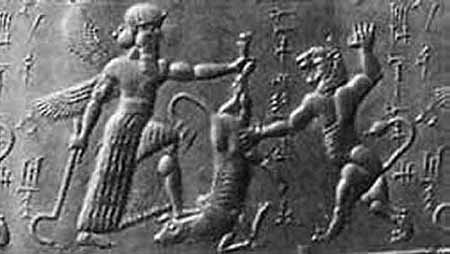
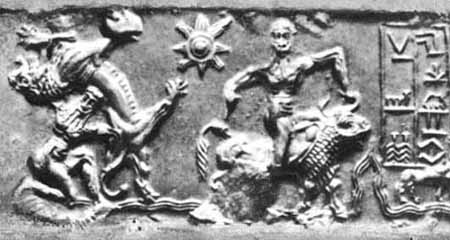
Gilgamesh and Enkidu on a cylinder seal from Ur III 3rd millennium BC, height 1-1/2 inches Enkidu has an apelike appearance which takes us to Thoth sometimes depicted with the head of a baboon, Apes takes us to reality as a biogenetic experiment set in linear time to experience, study, and record emotions. All creation myths point to a super-human race of giant gods or what is called Ancient Alien Theory. Gilgamesh would be considered the result of a hybridization program designed by gods who came to Earth to mate with early female humans.